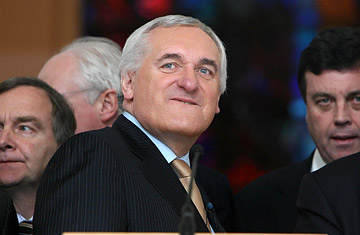
Irish Prime Minister Bertie Ahern announces his resignation at a press conference in Dublin.
Bertie Ahern, who stepped down as Ireland's Prime Minister today, leaves behind an country that is, in the words of poet William Butler Yeats, "all changed, changed utterly." His resignation as Taoiseach (Prime Minister) underlines the remarkable transformation over which he presided in his decade of leadership: Ireland has grown from an economic backwater to an E.U. success story, and has moved from a bastion of social conservatism to a more open and diverse society. But the same changes may also have ultimately cost Ahern, as Ireland also moved from a deferential political culture to one that asks hard questions of its leaders.
Ahern stepped down because of what he described as "incessant publicity" about a judicial inquiry into his personal finances. Long-running probes into corruption have become a common feature of Irish political life, but until recently Ahern had avoided any damage, earning the nickname "Teflon Taoiseach."
Even as questions about large cash loans from friends and associates piled up, Ahern routinely polled as Ireland's most popular politician, and defied many forecasts to win an unprecedented third successive term last year. Recognized by his peers as an exceptionally shrewd politician — one of his predecessors described him as "the most cunning of them all" — he played a key role in Ireland's epic economic transformation. He was also dedicated to the Northern Ireland peace process, once flying into a negotiation session directly from his mother's funeral. And he built on that to forge Irish relations with Britain that are at their best in a long and troubled history.
Ahern managed to combine his political smarts with the common touch of the retail politician, religiously canvassing his political base in Dublin's Northside, probably because he enjoyed drifting from pub to shop, chewing over the national budget or gassing about Manchester United, his favorite soccer team. He is known, everywhere, simply as Bertie, appearing to be on first-name terms with the entire Irish public.
In the age of spin, Ahern appeared to be the master of anti-spin — or at least of a spin so polished that the effort didn't show. It was ironic, then, that he appeared to have been undone by one of those events that defy political handlers and hit voters in the gut. In March his long-serving secretary, Grainne Carruth, broke down in tears in front of the inquiry investigating Ahern. She had testified that she made no cash deposits on Ahern's behalf, but after she was confronted with bank records proving the opposite, the tribunal chairman asked if she wished to consult a lawyer. She whispered back: "I just want to go home."
Carruth's testimony brought about a perceptible shift in the public mood, and Ahern suddenly appeared vulnerable. The junior party in his coalition government demanded explanations. He vigorously denied any wrongdoing — "one mistake I've never made is to enrich myself by misusing the trust of the people" — but he finally admitted that the affair had become a distraction from the business of government.
It's not over yet for Ahern. He still has to appear before the investigating tribunal to answer more questions about what he admits were "unusual" financial arrangements. But, provided he gets through that, his legacy as a transformational leader is secure. Nor should anyone assume he's finished on the political stage. Minutes after his resignation speech, bets were being laid in Dublin that the next president of the European Union will be known as Bertie.
